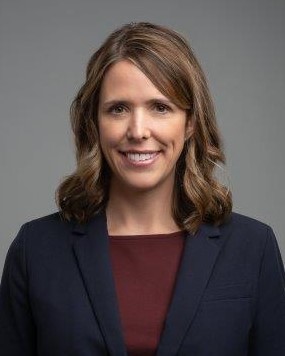
Minnesota Public Utilities Commission / Screenshot
Minnesota Public Utilities Commission Chair Katie Sieben leads a virtual commission meeting on April 16.
The state’s utility commissioner has postponed some issues while moving ahead with virtual meetings for others.
After postponing meetings for two weeks during the start of the coronavirus crisis, Minnesota’s Public Utilities Commission has resumed holding meetings virtually to comply with the state’s stay-at-home order.
Live meetings have been broadcast on the commission’s website for years, but the commission is now using Cisco Webex software to allow commissioners, stakeholders and the public to appear at meetings remotely.
 Katie Sieben
Katie SiebenChair Katie Sieben has continued to commute to the commission’s downtown St. Paul office to oversee meetings after running into technical difficulties with the software at home.
“Because I’m the chair and I have to run the meeting, I wanted to do everything possible to improve the quality of the Webex experience for the public to be able to watch and hear the meetings,” she said.
Appointed in 2017 and elevated to chair two years later, Sieben came to the commission after a career in politics and law. She served as a Democratic House member for 14 years, representing a suburban district. She recently spoke to the Energy News Network about how the commission is functioning and moving forward amid the pandemic.
The following interview has been lightly edited for length and clarity.
Q: What’s an average day like?
A: An average day consists of a lot of time on the phone and video conference calls, back-to-back meetings all day discussing the calendar schedule, the work of the commission. It’s been busy.
Q: How has your staff responded?
A: The Public Utilities Commission staff has been wonderful. They’ve been very understanding. The transition was hard the first week or two, but they’re adapting well — more smoothly than I expected. The frustration we’ve had is with spotty internet connections.
Q: How about meetings?
A: There have been a lot of people on the line representing different stakeholders and they were able to be heard, and in some cases, able to be seen.
Q: Looking forward, are you focusing on issues you can better accommodate online?
A: There has to be further discussion about what meetings can resume and which are better to hold when people can safely gather together again. But we have to balance that with statutory deadlines that require the commission to hold hearings before further permitting can proceed or require when the commission has to decide on a case.
Q: What might slow things down?
A: I don’t think working remotely will impact the permitting side or most of the work we do. We have several pending rate cases that we’re mindful of and want to proceed as scheduled. I’m more worried about the destruction of the supply chain. You probably heard about the outbreak of COVID at the wind plant in North Dakota. Those are the types of things I’m more worried about.
Q: Are there any significant cases that concern you, especially if the pandemic gets dragged out for months?
A: We have a docket related to grid modernization and a rollout of advanced meter infrastructure for Xcel Energy. There’s a statutory deadline attached to that.
Q: Has anyone complained about the digital hearings?
A: People are generally sympathetic and see that we’re trying to keep the regulatory environment as stable as possible and moving ahead as efficiently as possible while being careful to follow the governor’s executive order.
Q: Will live hearings be different when the commission returns?
A: I don’t think we’ll go back to the way things were before the pandemic. We are looking at ways commissioners can maintain distance while being in the same room to make decisions. We’re studying how we can be in the same room and further apart yet on camera, with participants still participating via Webex. We have to comply with the open meeting law, so we want to assure the public we’re following the law.
Q: How have utilities performed during the pandemic?
A: Remarkably well. The utilities have worked with the Department of Commerce and us on issues they’ve seen. They’re putting forward contingency of operations plans in case a significant portion of their workforce becomes ill. There hasn’t been a need to sequester employees yet, but they’re working on plans just in case.
Q: Has anything in your academic background, or work as a legislator, that prepared you for this?
A: I was working for U.S. Sen. Mark Dayton during the 9/11 attack and some things are similar. The suddenness, the economic impact, and the widespread job loss that has happened so fast brings back memories of that time.
Q: What do you miss most?
A: I miss having lunch with colleagues and friends and being able to see people and shake their hands and ask how they’re doing. There is something lost when you’re doing everything virtually.
Original source: Energy News Network